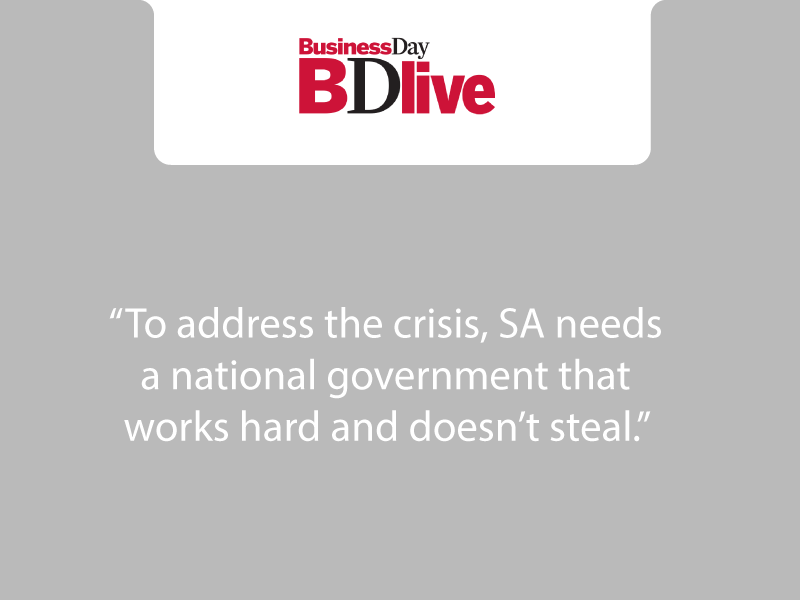 A report offering solutions to the unresolved issue was published 10 years ago and is even more relevant today.
A report offering solutions to the unresolved issue was published 10 years ago and is even more relevant today.
Twenty-four years into democracy SA has failed to deal successfully with the series of historic injustices, the impoverishment of millions of South Africans and the political furies that surround “the land question”. Ten years ago the Centre for Development and Enterprise (CDE), supported by business, published its third major report on land reform in SA. We issued a strong warning that applies with greater force today — land reform is in trouble.
This is not just another policy issue in which government capacity is unequal to a difficult task. This issue affects our constitutional compromise on property rights. For most South Africans, the history of land is one of pain and injustice. People must be fully compensated for land and assets that were stolen. The future of the land issue will affect the country’s ability to reach its economic growth targets, produce its own food and compete in global markets.
Our analysis of what was going wrong and what had been achieved in restitution, redistribution and tenure contained a set of far-reaching proposals. With support from Business Leadership SA, the CDE put forward a detailed offer for co-leadership and active involvement by the private sector in helping to ensure dramatic progress on SA’s complex land reform issues.
In 2005-08 the CDE ran an intense engagement, research and policy formulation process. We examined three sectors of the agricultural economy: fruit, timber, sugar; spoke to farmers across the country, including new black farmers; engaged with officials in the Department of Land Affairs nationally and in the provinces; heard the views of academics, including the pioneering studies that showed black South Africans were starting to benefit from new deracialised policies and buying land on the market; and researched the activities of organised agriculture and large agribusinesses, some deeply involved in starting to transform their sectors.
Many voluntary initiatives in the private sector had been aborted because of the scale of restitution claims gazetted on private land and delays lasting years in resolving them. Most rural South Africans do not want to become farmers. The vast majority want a secure place to stay. There are pockets of real land hunger in the country that should be identified and the purpose for which land is needed established.
SA is urbanising rapidly. Land reform therefore must include the identification and release of urban and peri-urban land for settlement, housing and economic development, as well as reform of ownership and use of land suitable for farming. Urban-oriented land reform will involve many more beneficiaries than providing rural plots for small farmers and will offer better access — to mixed sources of income for poorer households, to services and opportunities available in urban areas, and to the fruits of national economic growth.
There is no place in a land-reform strategy for a “one-size-fits-all” approach. There are large regional and sectoral differences among appropriate land uses. Effective land reform thus requires specialisation, experience and local knowledge. Far more of these strengths can be found in the private sector. Providing land alone will not allow new black farmers to succeed.
Much greater post-settlement support is needed, as is more complete integration of new farmers into the established farming community. Both will require greater involvement of local private sector players in effective partnerships with state institutions. The slow pace of processing and settling land restitution claims is creating uncertainty, stalling investment and having negative effects on agricultural production. The government has had only mixed success in acquiring land at reasonable prices and at an acceptable pace.
The government must make more funds available and they must be spent in a more market-sensitive way. Allowing inexperienced officials into the complexity of the land market with billions of rands, without support from skilled, ethical private sector professionals, will result in continued poor value for money.
In 2008 we argued that SA needed a bold new approach. The CDE and business leaders had one core recommendation: the country should immediately establish an action-oriented partnership comprising senior leaders in government and the private sector, particularly agribusiness. This presidential task team should have its own budget and report every six months to Parliament on progress with respect to land issues. Its work should focus on five areas:
- Completing restitution speedily. The resolution of the restitution impasse is the first priority for successful land reform because it lies at the root of so many other problems in virtually all regions of the country. Large agricompanies are offering assistance with creative plans to make speedy progress in generous settlements — they need willing and competent partners in the state.
- Getting redistribution on the right track and to significant scale in rural and urban areas. To do this we need an audit of state land and informed knowledge of the nature of demand for land whether for settlement or farming; by whom and in which parts of the country. A new public-private agency is needed to buy land effectively to meet the diverse needs of poorer people in the right parts of the country.
- Deracialising commercial agriculture through agribusiness support for redistribution and effective farming in each sector of the agricultural economy, black economic empowerment deals, and the establishment of villages for farm workers and families. (SA needs to redesign land tenure laws affecting commercial and communal land.)
- Tackling rural poverty directly. Establish a blueribbon commission to develop an economic and development strategy for rural “routes out of poverty”; establish an education fund of R1bn a year of state money to provide opportunities for rural learners to go to agricultural college, quality boarding schools and university.
- Spend more on land reform, and spend it better. Treasury has rightly been cautious in its allocations to the department and has had to retrieve unspent funds in the past. A bigger budget is essential but this can only happen if the partnerships we are proposing are established. The department does not have the capacity to spend more money effectively.
In 2008, we concluded: “Above all, we need to change the way we think and talk about land reform. SA needs to change the conversation about land. The country needs a new narrative that moves away from Zimbabwe-style terminology and focuses on how to help poor people escape poverty. Expand educational and economic opportunity to prepare rural South Africans for the 21st century.”
If only the government had responded to this unprecedented, far-reaching proposal. If only business had continued their campaign for change. In 2018 a national consensus is still there for the taking. The only question is whether leaders in the public and private sectors have the will to get land reform back on track. Bold action and leadership are required now.
Bernstein is the CDE head. The centre’s land reform papers are available at www.cde.org.za.




